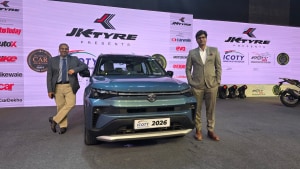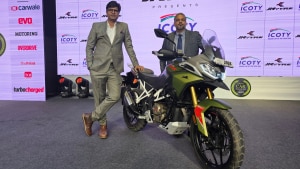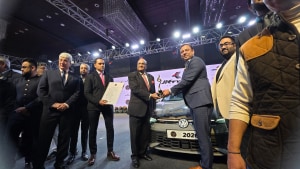Indian Auto Industry Forced to Dance to Government's Changing Tunes
Earlier this week while speaking at the annual convention of SIAM (Society of Indian Automobile Manufacturers) in a hall packed with senior representatives of the Indian automobile industry, the Road Transport Minister Nitin Gadkari said "I will request the finance minister to add an additional 10% GST on diesel engines. Reduce diesel production; otherwise I will increase the tax. Say bye bye to diesel in whatever way possible. Otherwise the tax will increase so much it will be difficult to sell!" After giving this threat to the industry, I believe the minister left the venue. But fortunately soon after he tweeted on his official handle that, "It is essential to clarify that there is no such proposal under active consideration by the government". While the reason for this volte-face is not known, I guess he was advised against it as suddenly increasing the tax would not only lead to resentment but would also be considered as volatility and adhocism in the policy making process of the government.
 Our Road Transport Minister Nitin Gadkari recently made headlines by saying GST on diesel vehicles will increase by 10 percent. Later he retracted his statement.
Our Road Transport Minister Nitin Gadkari recently made headlines by saying GST on diesel vehicles will increase by 10 percent. Later he retracted his statement.
Proper planning and a long term road map with sensible policies is something every citizen, businessman and industrialist hopes for. And it's something the Indian auto industry has been requesting and wanting for so very long. But sadly all our governments, be it the present or past ones, are all prone to knee jerk reactions and short term planning.
 Tata Motors just launched their face lifted Nexon and it has variants that run on three different fuels - diesel, petrol, and battery power.
Tata Motors just launched their face lifted Nexon and it has variants that run on three different fuels - diesel, petrol, and battery power.
I would also like to say I think Nitin Gadkari is one of the most well-meaning and efficient road transport ministers we have had and I admire his zeal and desire to improve road safety. But he is also famous for making out of turn colourful remarks. Gadkari also has this great talent for generating headlines and making news almost every time he steps onto a stage or speaks into a mike.
 While consumers still want diesel vehicles, the minister is doing everything to discourage them.
While consumers still want diesel vehicles, the minister is doing everything to discourage them.
Let me cite some examples of his showy statements. While speaking in parliament Gadkari had said that India's road infrastructure will be the same as that in the United States by 2024! In 2016, Gadkari said "The Ministry of Road transport stands committed to achieve 50 per cent reduction of road deaths in the country by 2020". To his credit, on several occasions after that the minister has admitted he has failed in this endeavour and road fatalities are not reducing, but increasing and this is a dark area in his ministry. But in 2021, Gadkari again claimed he will reduce road accidents and deaths by 50 per cent before 2025! As we have seen so often, saying is one thing, doing another.
 But for the moment Tata have decided to offer all three - petrol, diesel and battery power.
But for the moment Tata have decided to offer all three - petrol, diesel and battery power.
The minister had also strongly stated he will be making 6 airbags mandatory. And he had asked the auto industry to prepare for this. But just a few days back, Gadkari retracted and said that the government will not be making 6 airbags compulsory! He said, "It's up to the manufacturer and people to decide. We don't want to make the 6 airbags rule". He also added he believes the Bharat New Car Assessment Program or Bharat NCAP safety standards that will become effective from 1st October, 2023, shall hopefully encourage manufacturers to opt for more airbags in order to get better star ratings. But let's not forget, that Bharat NCAP is also voluntary and manufacturers can chose to send or not send their vehicle for such tests and star ratings.
 The uncertainty and constant change in policies definitely does not help in ease of doing business; something our Prime Minister Modi has been promising for a long time.
The uncertainty and constant change in policies definitely does not help in ease of doing business; something our Prime Minister Modi has been promising for a long time.
I have said this before and will say it again, all this uncertainty is not good for consumer confidence and it also adversely affects automobile manufacturers, who employ thousands of people and operate massive factories. They must plan well ahead to keep their businesses running smoothly. But instead it's like they are batting on a tricky cricket pitch, where they don't know which ball will turn, or bounce, or keep low. Every change they have to make to their vehicles, plans, and schedules, requires substantial resources and investments. So this kind of instability or lack of clarity and long-term planning in policies is most unsettling. And if we really want to grow and be seen as a nation where it's easy to do business, then these spur of the moment statements and decisions must end.
 The death warrant of IC engines has been signed. But they need to be phased out in a far better and well planned manner.
The death warrant of IC engines has been signed. But they need to be phased out in a far better and well planned manner.
Before concluding I want to ask a question. If we actually end up banning diesel fuel as has been suggested so often, then how will our tanks, self-propelled artillery, troop carriers, and so on run? They all have diesel powered engines. And so do most of our Indian navy ships and submarines. And if the government decides to make an exemption for our armed forces, what about our road transport industry? Almost all light and heavy commercial vehicles are presently powered by diesel engines. So in my view if diesel has to be phased out, which I am sure will eventually happen, it will have to be in a far better and planned manner and not by threatening the auto industry.














